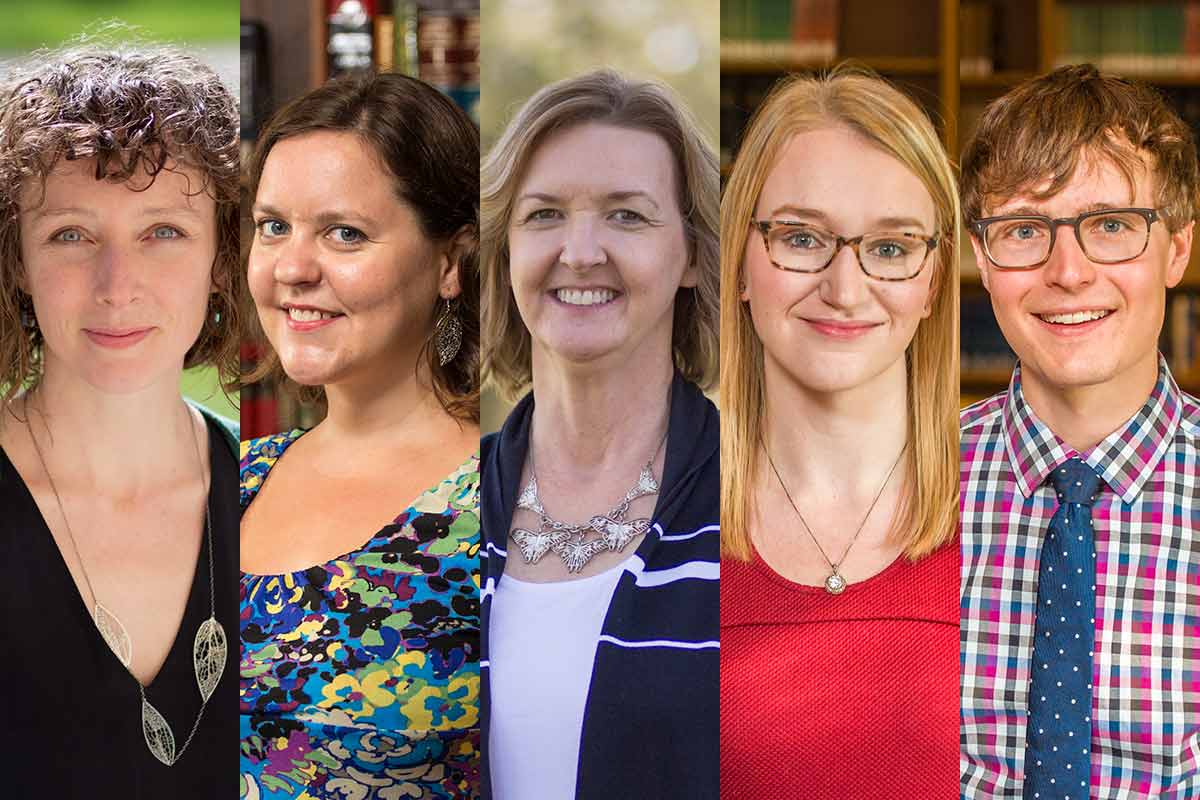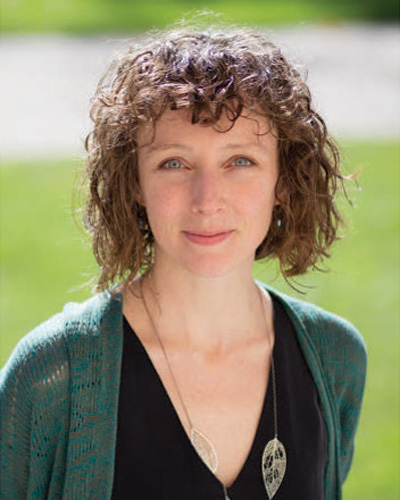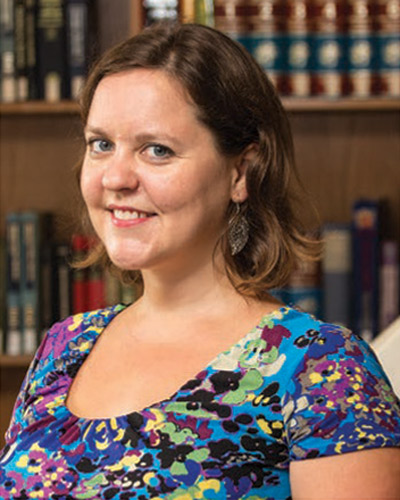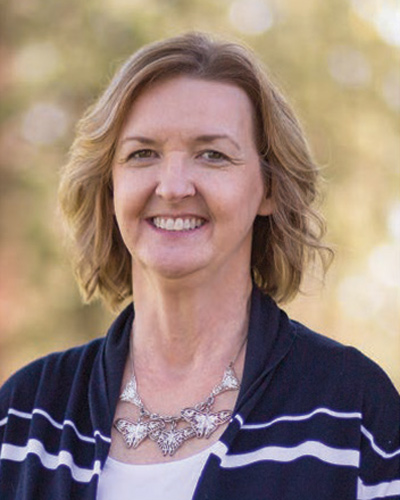

Jennifer Foubert
Assistant Professor of Educational Studies
Jennifer received her bachelor's degree in special education from Gonzaga University, her master's in education in curriculum and instruction from the University of Washington, and her Ph.D. in curriculum and instruction from the University of Wisconsin-Madison. Her teaching interests include critical pedagogy, elementary teaching methods and curriculum development, and sociology of education.
How did you first get interested in your academic field?
I majored in elementary and special education as an undergraduate, and I taught in Seattle Public Schools early in my career. I joke that I chose education as an 18-year-old the day before freshman classes started because someone scared me away from the pre-med program with stories of “how hard the math would be.” This is only half true. During my first practicum experience, I worked one-on-one with a third-grade child and taught her how to read. I decided to become a teacher because of her.
Why did you choose to teach at a liberal arts college?
I was drawn to teaching at Knox because we so clearly center student experience and learning. When I visited campus I was impressed by student engagement and investment—not only in their coursework, but also in their own scholarly interests, in the community, and current events.
Describe one of your favorite teaching moments?
I love teaching about teaching. It can get really meta. Recently in a curriculum class, we discussed the limits of an "IRE" pattern of discussion (teacher initiates, student responds, teacher evaluates) and examined ways teachers can facilitate conversations among students that center them as agents of learning and knowing. Eventually, we evaluated our own classroom discussion patterns, and examined my efforts to facilitate conversation that didn't revolve around me as the instructor.
Tell us one unexpected thing about yourself?
I like to draw cartoons—or quick sketches—of people I know. And I secretly want to learn about animation.

Hilary J.C. Lehmann
Assistant Professor of Classics
Hilary received her bachelor's degree in classics and English from St. Olaf College and her master's degree and Ph.D. in classics from the University of California, Los Angeles. Her teaching interests include Greek and Latin languages, classical mythology, Greek and Roman gender and sexuality, race and ethnicity in the ancient Mediterranean, and classical reception.
How did you first get interested in your academic field?
When I was a child I read a book about a young woman who goes to college, becomes a Classics major, and enters a world of magic, mystery, and intrigue. This book, as much as my enjoyment of high school Latin and love of Greek mythology, caused me to declare a classics major when I started college. Classics seemed to me to be the apotheosis of the college experience—esoteric, romantic, possibly magical. Immediately upon beginning my first Ancient Greek course, I fell hard in love with the Greek language, its vocabulary and grammar and linguistic intricacies, and the tantalizing glimpses it allows into the lives and subjectivities of the people living on the margins of the ancient Greco-Roman world. Even though being a classicist never did introduce me to any witches or fairies, I still feel an otherworldly spark every time I teach a classics course, and I try to kindle in my students the same sense of wonder that I felt, and still feel, when reading the words of people who have been gone for thousands of years. Collaborating with colleagues and students have made my teaching and research more multidisciplinary and inclusive, in the spirit of the liberal arts and of Knox.
Why did you choose to teach at a liberal arts college?
My undergraduate experience at St. Olaf College fulfilled many of my predetermined ideas of what college should be like. It felt like the life of the mind—reading great books, making art and music, encountering new ideas, having dinner at professors' houses. I loved the way my friends and I could bring together ideas from our different classes and make connections that blossomed and vined between disciplines; I dreamed of one day being in the position of my professors, facilitating these conversations and blowing my students' minds like ours had been blown. I have been delighted to discover that the liberal arts truly are just as fruitful and exciting from the professor's side of the classroom!
Describe one of your favorite teaching moments?
I love it when I can see the moment of realization on a student's face when they see something they thought they knew in a completely new way. This term, I've been thinking a lot about how the metaphors we use shape the way we see the world. I began the class I'm currently teaching by showing the Tabula Rogeriana, a 12th century map of the Mediterranean in which the cardinal directions we're familiar with are inverted—Africa is at the top of the map, Europe at the bottom. Looking at this map led to a discussion of how the concepts of “up” and “down,” evaluative metaphors linked to on/off and good/bad dichotomies, underlie the ways in which European-American cultures conceptualize the global south. A few weeks later, in a discussion about the post-colonial theory of Orientalism, I was explaining that “orient” means “sunrise” and “occident” means “sunset” and mentioned that this metaphor affects the way that those who use it see the world—the East is believed to be civilization in its childhood, primitive, while the West is seen as fully mature. As I looked around the classroom, I was surprised by the silence of the —normally voluble—students. Worried, I asked if this statement had offended anyone, and several students shook their heads, as one slowly explained, “No... it just makes a lot of sense.” Moments like these, when students realize that even the very shape of their world needs to be critically analyzed, make me so excited and so grateful to get to have conversations like this with the creative, thoughtful, and open-minded Knox students.
Tell us one unexpected thing about yourself?
I once spent 24 hours on Malta.

Monica McGill
Associate Professor of Computer Science
Monica received her bachelor's degree in computer science and mathematics from the University of Illinois Urbana-Champaign, her master's degree in computer science from George Washington University, and her Ed.D. in curriculum and instruction from Illinois State University. Her teaching interests include introduction to computing, game design and development, software development processes, and applications of new technology.
How did you first get interested in your academic field?
I was able to take a programming class in high school and really enjoyed it. I had to make a decision at the time to choose a college to major in music or explore this newfound interest by majoring in computer science. I actually ended up majoring in both math and computer science at the University of Illinois-Urbana Champaign.
Why did you choose to teach at a liberal arts college?
I was able to tour Knox in 2009, and was so very impressed, learning quite a bit about small liberal arts colleges. Even then I sensed that Knox’s mission was still rooted in its abolitionist past. Many of these aspects drew me to Knox. The holistic approach to students impressed me then and impresses me even more today. I have found students at Knox to be curious, inquisitive, intellectual, accepting, and motivated to learn, and it strikes me that Knox's environment and curriculum encourages the exploration and growth that they seek.
Describe one of your favorite teaching moments?
Before coming to Knox, I had the opportunity to facilitate several games for health designed by students, including Wake Up, Koala!, a game designed to create awareness about Sjögren's Syndrome (an auto-immune disease). Students traveled with me to Seattle to present the game to several hundred patients who were very excited about it. At the end of the day, one of my students turned and said “Am I the only one who's feeling like a rock star?” That was definitely a good day!

Kara Moore
Assistant Professor of Psychology
Kara received her bachelor's degree in psychology from the University of Texas at Arlington and both her master's and Ph.D. in experimental psychology from the University of Arkansas. Her teaching interests include cognitive psychology, psychology and law, developmental psychology, and memory.
How did you first get interested in your academic field?
From when I was a very young child, I remember being fascinated with understanding the world and the way things work. I remember taking car rides with my dad and asking him all of my questions. As I grew up, my questions became more honed in on why people do the things they do. I became particularly fascinated with understanding how serial killers differ from the rest of us. I loved watching shows like Dateline, 20/20, The First 48, and so on. This interest ultimately motivated me to go into psychology. Eventually my interests evolved into understanding errors in human thinking and memory, particularly in the context of the legal system.
Why did you choose to teach at a liberal arts college?
I craved and sought out a college culture where students were interested in learning and willing to work hard toward achieving learning goals. Before I even set foot on Knox’s campus for the first time, I could tell that Knox students' fit this description. In the brief time I have been here, I have not been let down or disappointed on that perception. In fact, the students here continue to astound me with how bright they are, how interested they are, and how hard they are willing to work to learn something new.
Describe one of your favorite teaching moments?
One of my favorite teaching moments occurred in my Statistics for Psychologists course. This course is notoriously difficult and often times students studying psychology do not have much of an interest or affinity for math. Overall, I love teaching this class because I get to see students who come into the class nervous and somewhat uninterested develop confidence and interest in using statistics as a tool to answer questions. In particular though, I especially enjoyed when I played a round of Family Feud with my students in the first week of the class to demonstrate a statistical concept. The students all really enjoy doing this, but the first time I ever did this, one of the students remarked something along the lines of “I was actually having fun in this class.” The student, of course, thought he was being funny and the other students laughed, but I was incredibly thrilled that students who came into the class dreading it were having a good time while learning some difficult concepts.
Tell us one unexpected thing about yourself?
Maybe this isn’t that unexpected but—I absolutely love learning. I like to joke that I’d like to be a lifelong student studying every topic imaginable! In case that isn’t too unexpected a revelation here are a few others—I love to bake (cookies, in particular); I was a first generation college student (my parents both had “blue collar” jobs); and I have an adorable dachshund named Maddie.

Mitchell Parks
Assistant Professor of Classics
Mitchell received his bachelor's degree in classics from Grinnell College and his Ph.D. in classics from Brown University. His teaching interests include citizenship, law, and civic values in the ancient world, and Greek and Roman myth and its reception in modern literature.
How did you first get interested in your academic field?
I was lucky enough to live in a school district where they offered Latin, and a series of three enthusiastic teachers in grades 6 through 9 infected me with the joy of studying a dead language. When my family moved to a different state while I was in high school, I could no longer take Latin formally, but I kept obsessively reading ancient literature on my own until I got to college: my version of a teenage rebellion!
Why did you choose to teach at a liberal arts college?
I spent my undergrad years at Grinnell, and, right from the start, the small liberal arts college environment appealed to me. Shortly into the first term, my academic adviser asked what I might like to do after college: I said, "Well, how do I get your job?" There was just something that delighted me about working through texts with a handful of peers instead of a large lecture hall full of students, and I also admired my teachers there, both in the classroom and in what I could see of how they lived their lives.
Describe one of your favorite teaching moments?
Fortunately I get to have favorite-worthy teaching moments on an almost daily basis: I teach a course called "The Classical World of Harry Potter," and it is immensely satisfying to hear students make connections between ancient and modern literature and start to understand both on a deeper level. When they start talking about how Harry's relationship with Ron Weasley is like how Odysseus interacts with his mutinous crew, I know they are hooked, and so am I. In terms of specific moments, well, there is always the time a student of mine in a Greek civilization course opened a session by "sacrificing" a fake pig made of hot dogs, ketchup, and a paper pig mask, but that is a long story.
Tell us one unexpected thing about yourself?
A few years ago, I designed and made a prototype of a board game based on the Iliad. I am not sure how satisfying it is as a game, but I do think it is a pretty decent Homer simulator.